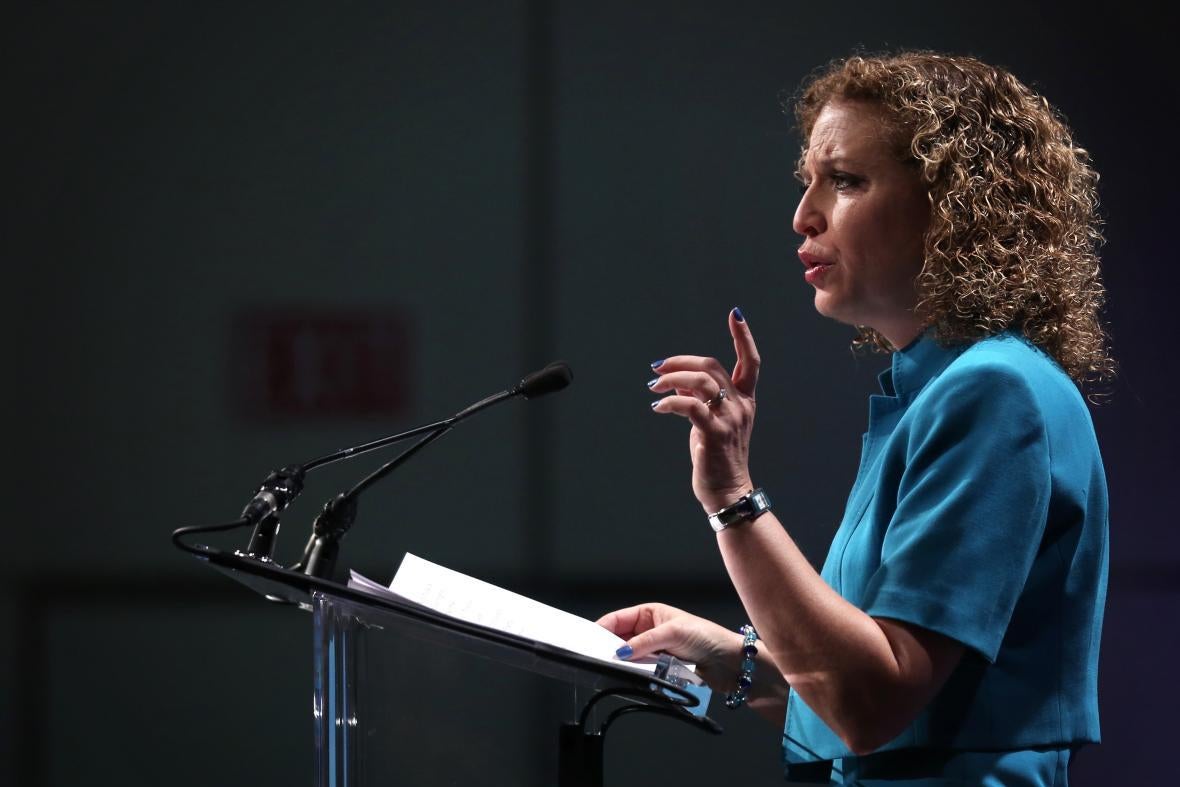LAS VEGAS—It’s the day of the first Democratic presidential debate, and all anyone wants to ask Democratic National Committee Chairwoman Rep. Debbie Wasserman Schultz is why there won’t be that many more debates.
The spat between Wasserman Schultz, whose DNC sanctioned six debates throughout the primary season, and her intraparty detractors ramped up this week. Lower-rung candidates like Martin O’Malley have been pressuring Wasserman Schultz for some time now to up the number of debates and eliminate the exclusivity rule, which penalizes candidates who participate in nonsanctioned debates.
This week, just as Wasserman Schultz was trying to keep the attention focused on the candidates, their policies, and their national self-introductions, some kind of conflict broke out between Wasserman Schultz and a DNC vice chair, Rep. Tulsi Gabbard. The two members of the party brass have differing recollections of what went down. Gabbard, who has been calling for more debates and implying that Wasserman Schultz runs the DNC with an unseemly, top-down approach, claimed that Wasserman Schultz disinvited her from tonight’s debate as punishment for insubordination. A DNC spokeswoman and Wasserman Schultz denied this and claim that Gabbard’s crusade for more debates was causing a “distraction.” Which it almost certainly has been: a delicious, juicy distraction.
Wasserman Schultz doesn’t care for distractions, but reporters do, and reporters also love watching her get all bent out of shape flailing to stay on message. At a pre-debate roundtable event Tuesday in the Wynn Las Vegas with Nevada Democratic Party Chairwoman Roberta Lange and Nevada Rep. Dina Titus, Wasserman Schultz desperately tried to stay on her very serious message: how the cackling, evil Republicans plan to kill everyone, whereas the Democrats do not. After each of the panelists introduced themselves, Wasserman Schultz opened the room to questions. You’ll never guess what the first question was.
“Congresswoman, can you explain to us what your staff might have told Congresswoman Gabbard in terms o—”
“We’re here to talk about the issues we’ve been talking about this afternoon,” the chairwoman interjected, “and so we’re happy to take questions about that … the focus of today is on our candidates, and that’s what we’re going to answer questions about.”
Wasserman Schultz doesn’t seem to be winning this PR war. If anything, her warning has only galvanized Gabbard to go on television as much as possible to continue the feud. “It’s not surprising to me that [Wasserman Schultz] is saying things that aren’t true,” Gabbard said in an interview Tuesday.
The thing is, Wasserman Schultz doesn’t seem to win many PR wars. That would seem to represent a gaping hole in the CV of the Democratic Party’s chief spinster. All operatives spin, but the good ones are at least occasionally able to disguise their spinning. Wasserman Schultz is not one of the good ones.
That said: She has thus far withstood significant pressure to increase the number of debates and not budged. Is there a way that could change tonight? The DNC certainly won’t open the door to that possibility. But the DNC’s job is to protect the Democratic nominee, and that is—still—Hillary Rodham Clinton. If this first debate gets unexpectedly frisky and Clinton can’t hold her own, Schultz would probably not want to add several more. If it’s calm and Clinton prospers, well, why not add more? That may not be the fairest way to think about it, but there doesn’t seem to be much fairness in Debbie Wasserman Schultz’s DNC.
